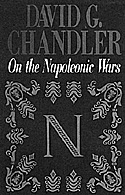
Author: David Chandler
Pages: 270
Illustrations: 11 black and white reproductions of period illustrations.
Maps: 13--one strategic showing the Peninsular theater of operations, and twelve battle maps.
Footnotes: None.
Appendices: None, but there are two tables, including one showing seven different coalitions allied against France, which countries were involved, and treaties from 1792 to 1815.
Bibliography: 164 various sources, including books, journals and archives, annotated and grouped according to each of the sixteen chapters.
Index: None.
Publisher: Greenhill Books, London (through Stackpole Books in the U.S.)
Publication Date: 1994
Binding: Cloth (hardbound)
ISBN: 1-85367-158-4
Price: $34.95
Summary: The latest from David Chandler's prolific pen, this work is, to use Chandler's own words, a collection of "random jottings" produced over the thirty-plus years of his career teaching military history. Supposedly, such published collections were much the way of earlier English authors, often marking their retirement from the active literary world. Hopefully, this is not the case in this instance.
This book begins with an introduction that is, in fact, an autobiography of the author. What follows is a collection of sixteen short essays, presented in chapter form. Most of these are not directly related to one another, so, in consequence, there is no overall theme.
Each essay appears to be the type often presented as a paper at academic symposiums, and indeed some were. Although scholarly in nature, their short length condemns many to only a superficial review of the topic at hand. None of the essays are footnoted. Five years ago, Dr. Harold Parker of Duke University spared no effort to convince this reviewer that footnotes were "the litmus test of scholarly literature." These must have been removed from the original essays prior to their publication in the book as a friendly gesture to a more general audience. [Editor's note: David Chandler confirmed that the footnotes were removed.]
The bibliography is organized by chapter, with notes about the various sources consulted. Although not the easiest bibliography to use, the discussions are interesting.
To comment on just a few of the essays: the second chapter on the British reconquest of Egypt is a brief description of the British victory over a failing French opponent. It is a reasonable, short review of the 1801 campaign which should serve to encourage further reading on the topic. [See British Victory in Egypt 1801: The End of Napoleon's Conquest by Piers Macksey, reviewed by Nafziger in Napoleon #1, pp. 34-35.]
The fourth chapter on Marengo during Napoleon's second Italian campaign in 1800 is a most enlightening essay on Napoleon's revision of the history of this famous battle. Chandler cites the existence of a copy of the original French staff report, which somehow escaped Napoleon's ordered destruction. Unfortunately, after noting its existence, Chandler fails to say where it is located!
The fifth chapter is a well done thumbnail sketch of Napoleon's marshals. Devoid of Francophobia or Francophilia, this essay is an excellent introduction to them.
The eighth chapter on the Battle of Sahagun in Spain in 1808 is interesting, but its conclusion is questionable. Chandler says that this battle "proved that, man for man, the British cavalry was in every way more than a match for the French mounted arm." The description of this cavalry clash notes that the British 15th Hussars struck and broke the 1st Provisional chasseurs a cheval, a regiment of "Hanoverians absorbed into the French Army of Spain" that attempted to receive the British charge with fire from their carbines. The Hanoverians were pushed back onto the French 8th Dragoons standing behind them, disordering the dragoons and forcing their regiment to break as well. Since the ruler of Hanover at that time was the King of England, and because the Hanoverians are ethnic Germans, how this particular engagement proves that British cavalry was superior to French cavalry eludes this reviewer.
The fifteenth chapter includes an unusually heated exchange between Dr. Chandler and an unnamed French American who took issue with something Chandler had written. The esteemed author does not suffer fools gladly and had little compunction about setting the record straight.
This book is well worth the price for someone seeking a quick introduction to the various topics it covers. Because of the shortness of the essays, however, those who seek more detail might be better directed to start with Chandler's masterpiece The Campaigns of Napoleon (Macmillan Publishing Co., Inc., 1966).
Other Book Reviews:
-
La Grande Armee by Georges Blond
Napoleon Conquers Austria by James Arnold
Back to Table of Contents -- Napoleon #3
© Copyright 1996 by Emperor's Press.
This article appears in MagWeb (Magazine Web) on the Internet World Wide Web.
The full text and graphics from other military history magazines and gaming magazines are available at http://www.magweb.com